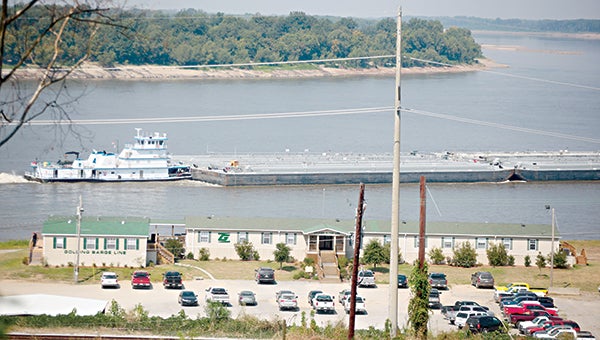Golding Barge beneficiary of energy boom
Published 11:34 am Wednesday, July 16, 2014
A booming energy market in the U.S. and quality employees have been the main influences in Golding Barge Line’s growth over the past four years, Austin Golding told members of the Vicksburg Kiwanis Club Tuesday.
“We’ve really been a beneficiary of the energy renaissance in this country, through and through,” said Golding, the company’s marketing, sales and customer service manager. He said later during a question-and-answer period that nationwide about 50 percent of the barge cargo on the country’s inland waterways consists of petroleum products.
Begun by Steve Golding in 1995, the company is located at 100 Lee Street on the shore of the Mississippi River. The company currently has a fleet of 18 towboats and 80 barges and employs 185 people. It expects to have a total of 20 boats and 225 employees by July 2015, Austin Golding said.
“Over the next nine months, we expect delivery of four boats,” he said. “Two of them will replace least horsepower (boats).
“Last week, we finalized the architectural plans for our office,” he said. “I think you will see in the next 2 to 3 weeks some pilings start to be augered. Hopefully by this time next year, we’ll be putting the final touches on it.
“It’s going to be a great facility down there. It’s going to be built about 12 feet off the ground. It’s going be functional. It’s going to be an A-frame building on a concrete slab. It’s going to have a lot of interchangeable parts in the middle, because we still plan on growing.”
The towboat business, he said, “is a business that has really seen a lot of growth in the last four years coming out of the recession,” because of the use of the fracking process to extract oil from the ground.
All of the oil produced from the process, he said, “has to get to some mode of transportation. The highways are full of trucks. You can’t get a tank car now, they tell me, for about a year-and-a-half. It’s got to get to the refinery somehow, so we put it on barges and move it.
But the real key to Golding’s success, he said, is its employees.
“That is ultimately what defines our product and what our brand is,” he said.
He said he promotes the personal-type service Golding can give as opposed to its large competitors during his presentation to customers, pointing out that while he can’t promise a large fleet of boats, he can move their products “safer, more efficiently, and you’ll know every hour of every single day what’s going on with it.
“But it means nothing if the boats don’t perform the way I promised our customers they way they would,” he said.
Having good employees, he said, means taking a personal interest in them and treating them like they are someone.
He said Golding’s workers include three groups — those who have been with the company since its first boat was built in 2004 “and helped establish our brand;”
A second set of workers who were trained by the company; and a third group of people “who got tired of being a number someplace else” and wanted to “go to a company that knows what I’m doing, knows my name and calls me up and tells me I’m doing a good job.’”
Golding said the company’s training program and the pay scale are what develop long-term employees.
“We can take a young man at 18 to 20 years old, and as a new hire he makes right at $30 to $35,000 a year as a deck hand,” he said. “After about 12 months, after he’s trained and hopefully watched how the process works. He’ll got to a classroom orientation and a transfer orientation where he learns to load and unload barges, his salary jumps to $60,000 a year after one year of employment.”
If the employee is a good worker and enjoys his job, Golding said, he could, after three years of working as a tanker man, become a licensed pilot and start at about $130,000. But there is a price to pay: working 12 hours a day in all types of weather and spending eight months of the year on the water.
“That’s a sacrifice, and we will reward that sacrifice with opportunity and growth,” he said.
“We’re only going to grow as fast as we can grow our personnel,” he said. “You can slap metal together, you can put propellers on boats, but if you don’t have the right personnel, your brand is lost.”
He said Vicksburg has been the right spot for the company to call home because of its location and his family’s investment in the city.
“We really enjoy being in Vicksburg. The way technology is now, we could be located anywhere,” he said, adding some of Golding’s larger competitors are located in areas like downtown Houston, Texas and downtown New Orleans.
“We like to be on the river down front where the action is,” Golding said. “It’s a lot of fun to watch the boats come by. There are some days we don’t have a whole of production for an hour or two because we’re watching them go by. Everyone’s gotbinoculars on their desk.”







